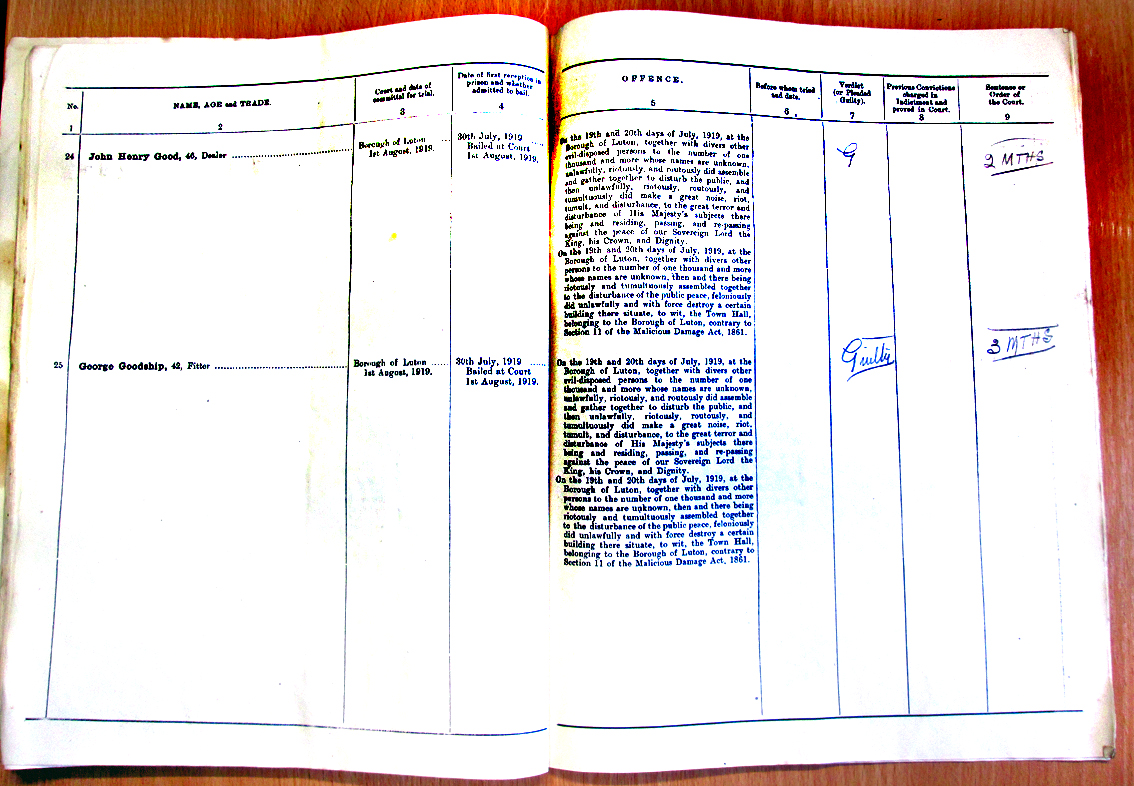
- Assizes record courtesy of Mr John Gillespie, grandson of Insp Fred Janes.
John Henry Good, aged 46, labourer, of 74 Dane Road, Luton, was charge that: “On the 19th of July 1919, together with divers other persons to the number of one thousand or more unlawfully and riotously did assemble to disturb the public peace and then did make a great riot and disturbance to the terror and alarm of His Majesty’s subjects there being and against the peace of our Sovereign Lord and King, his Crown and Dignity.”
MAGISTRATES COURT
Brought before magistrates on August 1st, 1919, Good was said by Sgt John Matsell to have rushed the Town Hall as soon as the Peace Day procession went by and cried: “Let's fetch him out.” Witness pushed him away, and then lost sight of him.
Prisoner was excited, and had on a previous occasion been convicted of being drunk and disorderly and of assault.
Fireman G. Evans, of 42 Church Street, Luton, said that about 1am on Sunday he was working through the crowd from the fire station to Chief Officer Andrew in Upper George Street. He saw Good, who was known as 'Kissing Cup'. It was stated that he was so known because he often recited in the street a poem entitled 'Kissing Cup's Race'.
Witness said accused had a piece of wood like the leg of a chair. He was waving it and leading the crowd, and was close to the chemist's shop. Witness admitted that he had once before seen prisoner waving a stick about. He did not give him a chance to hit him.
In cross-examination, Mr Barber (defending) tried to convey that Good had only a walking stick. He had served three years in France and received several decorations. He was remarkable in that he had a most excitable temperament. He recited at concerts on behalf of the men who had served, and in his reciting he had the same way of gesticulating. He had done nothing against the peace.
Good was committed and, in applying for bail, Mr Barber said the man had been in hospital for medical treatment. There being no opposition, bailed was allowed in £10 and a surety of £10, accused also being bound over to be of good behaviour.
AT THE ASSIZES
Giving evidence on his own behalf, Good said he was a discharged soldier and, although not wounded, had two bad accidents in France and was getting a disability pension.
He was asked by the Comrades to take part in the Peace Day procession, but declined as he could not march, so he went to the bottom of Wellington Street to see it go by. There was some noise after the procession went by, but he denied doing anything to excite the crowd. It was a case of mistaken identity to say he was there at night.
Prisoner agreed there were speeches about bringing out the Mayor, although he did not remember that being said about the Town Clerk.
Cross-examined, prisoner agreed that after the fireworks [at Pope's Meadow] he walked back to the Town Hall but he was not there later than midnight. He had been treated fairly well since he left the Army and said he had no grievances.
Good was found guilty of rioting in the afternoon, but not guilty on other charges of demolition and riotous damage.
Judge Greer, in sentencing Good, said he attached very little importance to the evidence that prisoner was in the crowd that night, waving his stick, and was not going to punish prisoner for having had anything to do with the evening's proceedings.
He would also take into account the fact that according to the evidence prisoner did not make use of foul language. The sentence would be two months hard labour.

